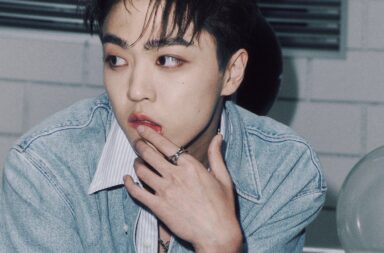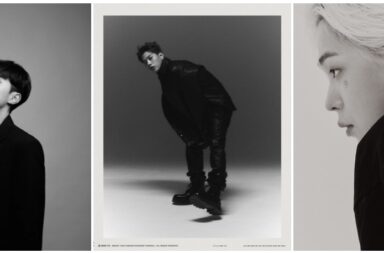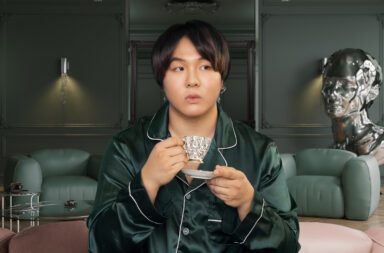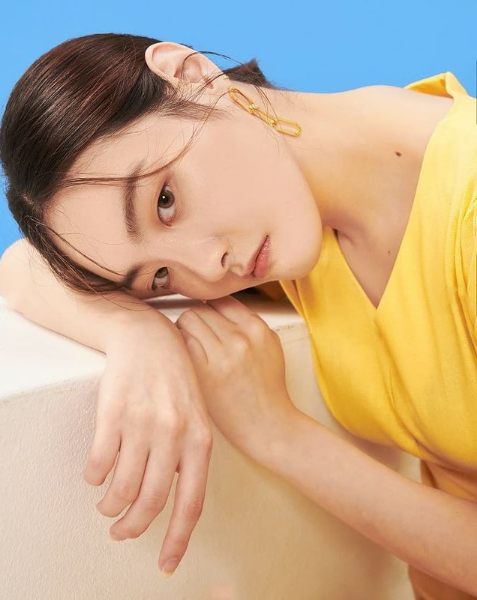
It’s no secret that the Korean music industry is extremely difficult to break into, let alone survive in; even with the global expansion of K-pop, that remains as true today as it was ten years ago. That chance of success becomes even more slim when you don’t have the support of a label – for those who aren’t lucky enough to sign with a decent company, establishing even a small audience by themselves can take years.
Artists in this category are limited by their skills, luck, and perseverance. Testing all three is YerieL, a 29-year-old (in Korean age) female artist just two years and a handful of songs into her career as a singer-songwriter. Starting from “닿아 (Reach)”, a soft piano ballad released in late 2019, YerieL has experimented her way through a variety of genres while looking for her own sound, resulting in several interesting and rather different singles.
The latest of them is “Closet”, a hazy, retro-pop number markedly more sensual, sophisticated, and dark than her melancholy debut. With a smooth, sweet voice painting self-penned lyrics over largely self-composed songs, YerieL’s prowess as a trained musician (she played classical piano for ten years) gives her musical experiments an intentionality that many younger singers lack.
Still, the industry hasn’t been kind; from snide comments during her time as an idol trainee, to filming an MV before finding out that the song’s composer had vanished with the song, to having her first appearance on a TV show cancelled days before airing – 2020 was as tough a year for YerieL as it could be, even without Covid-19. We spoke with her via email about her latest release, “Closet”, her musical roots, and her personal struggle to find success in this harsh industry.
Thank you for speaking with us, YerieL! Please introduce yourself to our readers.
Hello Seoulbeats’ readers! I’m singer-songwriter YerieL. This is my first time greeting an English-speaking audience, so I’m really nervous but also excited for this interview! I hope that this interview can bring me and the Seoulbeats readers a bit closer.
How would you describe your music to someone who has never heard of you before?
I like to think of my music as a spaceship exploring the universe of pop music. I’m inspired by pop music from so many different ages – the 70s, 80s, 90s – that it’s hard to distinguish between them. My sound pulls from all of these various genres, so there’s definitely a base in pop music… But shall we say it’s like a spaceship exploring all these different eras of pop? My musical curiosity drives me to explore all these different planets of sound and discover new sounds that inspire me.
How did you decide to become an artist, and how did you get to where you are now?
My first exposure to music came through piano lessons when I was in kindergarten. I don’t know if it was just because my parents liked music, but they sent me to piano academy, and I studied classical piano for nearly ten years after that. At the recommendation of my piano teachers, I entered competitions, and even though I never got first place, I think winning awards naturally helped solidify my interest in music.
In high school I stopped playing piano to focus on my studies. After taking the college entrance exam in my third year of high school, I auditioned [for a company] just for fun. When I started training, I naturally started to want to become a singer. I started out as an idol trainee, but to be honest, I began to dream about becoming a singer-songwriter rather than an idol or celebrity. So, I decided to become an ‘artist.’
You talked about some of the struggles you faced in your interview with Normal Ground. Could you tell us more about your experience in trying to establish yourself as an artist in Korea?
Truthfully, I still carry so many negative memories. Even if I don’t remember them all well, as soon as I read the question, so many memories began to resurface. I suppose the most memorable event would be when my debut and album release were cancelled at the last minute. Because I was young, I blamed it on myself – but that’s hardly uncommon. I had readied myself to handle these kinds of situations. However, my participation on MBC’s Gini Stage is an experience I find quite regrettable.
The hardest part was the way others talked about me. Of course, as a singer your life is public, but those kinds of comments lowered my self-esteem. As a trainee I often heard things like “you’re too ugly,” “you can’t sing,” or “you’re too fat”. I spent my early twenties with low self-esteem because of that. I knew I wasn’t a bad person, but the comments still hurt me, and bit by bit I fell apart. That’s why I started to try harder. Now, instead, I’m working so hard on my diet and singing that people around me tell me “You work really hard. Your passion is amazing”. My goal is to keep at it until I’m happy with myself, though I don’t know when that will be.
What kind of artist would you like to be known as? How would you like people to feel when listening to your music?
Ever since I decided to become an artist, I’ve been determined. Rather than people listening to my music and thinking “Wow, she sings so well and can hit high notes”, I’d prefer to have people to feel a lingering sense of comfort and empathy when they listen to my music. Beyond that, I want to try to take on various genres and improve with each album. I want people to think of YerieL as someone who hasn’t neglected to study music.
You’ve tried a few different styles on your songs, including ballads such as “닿아 (Reach)” and R&B songs such as “LINE”. Have you discovered your sound, or are you still exploring?
In short, I’m still looking for my own colour, the kind of music I want to make, and the music I’m good at. I think I should work to close the gap between what it is that I want to do and what I’m good at. I actually don’t like the ballad genre that “닿아 (Reach)” falls under. R&B and old-school music are the genres I enjoy, but when I released the album I thought it might be best to put out a more public-friendly song, as opposed to a genre I wanted to do. I’d always heard that ballads were best suited for vocalists, and when I was young they were the songs I sang alone to myself the most.
With “LINE”, I decided to try making music that I liked instead, as a challenge for myself after studying music and practising singing a lot. So, “LINE” became my first attempt at R&B.
Who are your biggest musical influences and why?
Boyz 2 Men are the group that I admire most and that have always inspired me to work hard at music. I still remember the impact Boyz 2 Men had on me in high school the first time I heard them. I wondered what on earth I’d been listening to up until then; their music was perfect, beautiful, and the members’ voices were so harmonious.
Since then, I’ve been really into R&B. Not just R&B as music, but also the way it was incorporated into new jack swing and how social issues were included in the lyrics. Unlike the hip-hop trends of the time, when the [Boyz 2 Men] album was released, it dealt with the issues not with aggression, but with positivity (love and harmony). It was so refreshing to me. The song they sang in memory of Princess Diana also positively influenced me [“One Sweet Day” with Mariah Carey]. The true meaning of the lyrics was revealed much later, but the story behind it is my favourite.
In 2019, I managed to get tickets to the Boyz II Men concert in Korea, and finally got to experience them from the VIP section. It is my happiest memory in the last five years.
Please introduce your new song, “Closet”!
“Closet” is my first time challenging myself with retro-pop. It has an addictive medium tempo with a funky rhythm and electric piano and synths that are full of retro feeling. I wanted to make the song more appealing with a heavy bassline and catchy hook. I also wanted this song to have great mastering, so for the first time we worked with a company outside of Korea. We sent the song for mastering to Metropolis Studio in the UK, and I’m very pleased with the results!
What song of yours would you like to recommend most to our readers?
The songs I most want to recommend are “LINE” and “Closet.” “LINE” is my first R&B song, so it’s the song I spent the longest writing the melody and lyrics and recording for. I wasn’t happy with the song as I was writing it, so I kept making adjustments and that really stressed me out. However, after the song’s release, I can feel the earnestness in it, and I’ve grown to appreciate it.
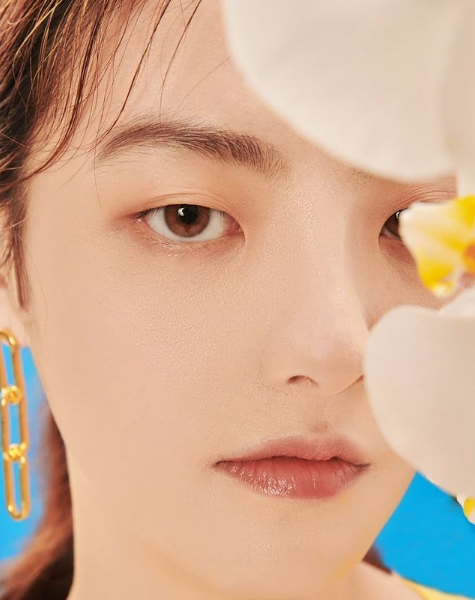
In the case of “Closet,” I had always wanted to try funky electro-pop, but I also had a lot of doubts over whether I could actually sing this kind of song. It’s a genre that I’m really into these days, but I worried that even if I made a good song, my vocals might ruin it. However, with the support of my producer and others around me, I was able to challenge myself, and ultimately be satisfied with the result. In my opinion, out of all my songs, “Closet” is the trendiest and the closest to the direction I’d like to continue in, so I recommend it.
Are there any genres, styles, or concepts that you would like to try next?
I haven’t settled on a genre yet for my next track, but I do know that – as someone who is 29 years old now (in Korean age) – I want it to be a song that expresses YerieL in her twenties. I’m always thinking about which genre would best suit the story of my twenties, and wondering what content to include in the lyrics. There are so many things I want to include, and genres I’d like to try, so I’m passing my days with these kinds of happy worries.
You are credited with helping to compose a lot of your songs. Can you tell us about how the music came together?
Since I’ve used the piano to write songs for myself since I was young, I’ve been limited to acoustic and ballad-style songs. So, I asked producers that I knew if they wanted to collaborate. After that, I shared what kinds of styles and genres I liked, consulted with them, and learned a lot about the things that I lacked. After discussing in detail with the producer(s), they made the track, delivered it to me, and then I worked on the toplining. These days, I’m working this way. As I’ve never properly studied music, after working on the toplining I tend to consult with the producers and work with them to adjust the parts that are awkward, or to add variation where needed.
How about your process for writing lyrics? What kinds of stories do you like to tell, and what do you focus on most when writing them?
Before “Closet”, all the lyrics I wrote were based on my experiences. Rather than writing [prose], I like writing lyrics, so as I go through my day, I tend to make little memos in my phone about my feelings and thoughts. This is often what I do when I think of song titles I like. Especially in the moments where I can’t put a specific word to my feelings and experiences, I can set them aside to think about at moments when I’m alone and can space out, like when I’m on public transport. So, I always make memos for myself when that happens. The best moment is when I ride the bus over the Han river at night and I see the night view. My mind calms, and that’s when I can organise my thoughts into lyrics best.
“Closet” was first written around the genre of the song rather than the lyrics. Because of the mood of the song, I didn’t want to write a common love song. I was spacing out while singing and I noticed the gap between the doors of my closet. I thought, what if someone hid in there and peeked at me every day because they love me? So I wrote the lyrics about that. It was a fun experience because it was the first time I’d written a song 100% with my own imagination.
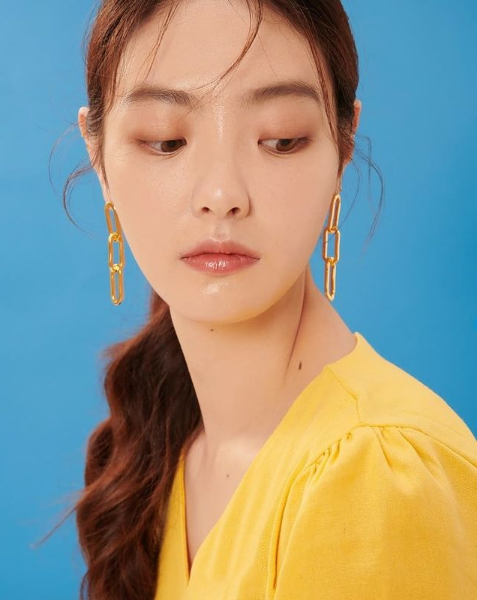
What can we expect from you in future? Will you be releasing an album soon?
I’m planning to release my next album in autumn. I think it might take a little more time to make music that is better and more complete.
Where can interested readers find your music and follow your activities? Do you have any social media that you would like to share?
My music is available not only in Korea, but on worldwide music sites, and always uploaded to YouTube. You can check out my daily life and updates on my Instagram.
Thank you for speaking to Seoulbeats! To finish, what would you like to say to our readers?
I wanted to become closer with the readers through this interview. I think we’re one step closer, what do you think? Through this interview, I was able to reflect on my music and mindset as an artist, so I was happy while answering. From now on, please keep an eye out for YerieL and her music! I will continue to work hard to make good music that calms the corners of your heart.
